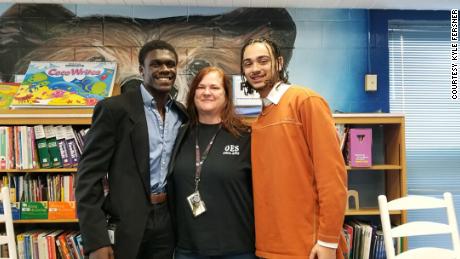Fersner was observing the boy's class as part of his school's teacher cadet program in South Carolina that he'd joined out of curiosity. "Hey, you look like a rapper," Fersner recalled the boy saying. "He said I look like Lil Pump," a popular rapper of Hispanic descent. At the time, Fersner's hair was long and braided, like Lil Pump's. But that fifth grader's comparison got Fersner thinking about a teaching career. "In that instant, I knew this is something I can make a difference with," he said. "More than likely he's never had a teacher who looked like me."
Minority male teachers are hard to come by
Black men make up 2% of teachers in the US, according to the National Center for Education Statistics. The same goes for Hispanic male teachers. Meanwhile, the student population is far more diverse and getting more so. White enrollment in public schools fell from 61% in 2000 to 49% in 2015, according to the US Department of Education. Research shows that for minority children, having at least one teacher that looks likes them is a key to their success, said Roy Jones, a professor at Clemson University's College of Education. He cites a Johns Hopkins University study that found low-income black students with at least one black teacher in elementary school are significantly more likely to graduate high school and consider attending college. "It's not only important that the teacher looks like and reflects the demographic of the student they're teaching. It's because of the experience and background. Their ability to relate and identify with the child is critical."
"Call me MISTER" recruits teachers of color
To address the problem, Jones founded the program Call Me MISTER while teaching at Clemson. MISTER stands for Mentors Instructing Students Toward Effective Role Models. It's a college program offered through 24 South Carolina universities that recruits minority men to major in education. It provides scholarships, extensive academic counseling and summer teaching internships.Since the program began in 2000, it has expanded to colleges in 10 more states. "Our 'Misters' come from the same environment, the same places and spaces that the children come from. That's why they relate so well and can bring them along," Jones said. The students also live together as a sort of brotherhood, to encourage each other on the path. Jones cites other, higher-paying professions as a major reason young black men don't become teachers. "You've got black males going to college that aside form athletics are choosing to go into health professions, business, engineering, social science." When it comes to college athletics, Jones says, there's a much stronger pipeline of recruitment and support. "Not only money, but they get the tutoring, the counseling, their own separate dormitory, they eat well — because of what their perceived value is."  And while many minority students know about the resoundRead More – Source
And while many minority students know about the resoundRead More – Source




